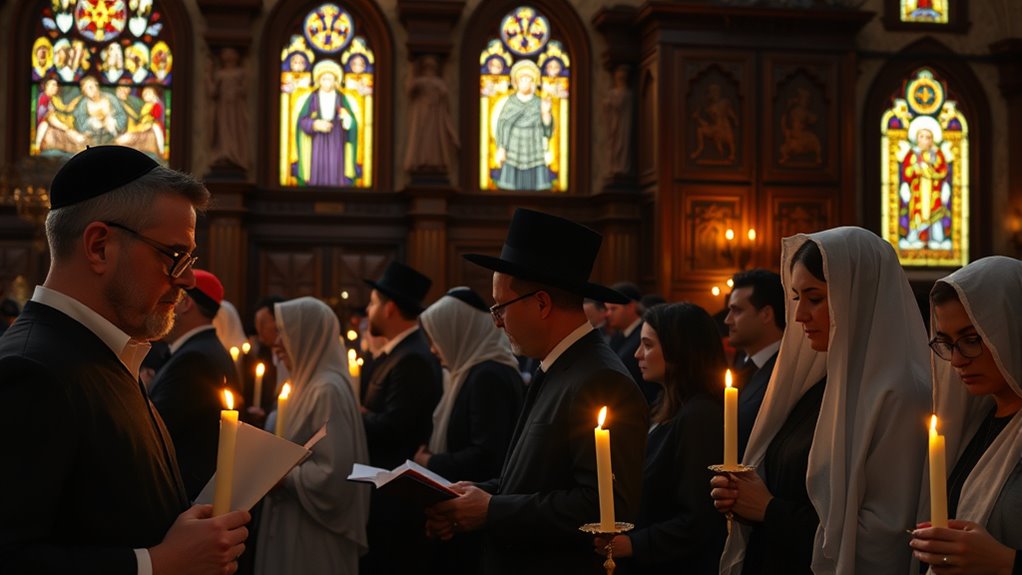Intermittent fasting is a global cultural practice rooted in diverse spiritual and traditional rituals. In Islamic traditions, Ramadan involves fasting from dawn to sunset, while Christians observe Lent with penitential fasting. Jewish communities mark Yom Kippur and Tisha B’Av with solemn fasts, and Hindus dedicate fasting to festivals and deities. Buddhist practices combine fasting with meditation for mindfulness. Many indigenous groups also have tribal fasting rituals. Exploring these practices reveals how fasting connects communities worldwide—continue to discover more.
Key Takeaways
- Intermittent fasting is practiced globally across various cultures, often linked to religious, spiritual, or traditional rituals.
- Many cultures incorporate fasting during festivals or specific days to reinforce community bonds and cultural identity.
- Ritual fasting promotes reflection, self-discipline, and spiritual growth, serving as a means of cultural preservation across generations.
- Different traditions emphasize acts of prayer, meditation, and community participation during fasting periods.
- Fasting practices vary worldwide but universally support values of humility, resilience, and cultural continuity.
Fasting in Islamic Traditions: Ramadan and Beyond

Have you ever wondered how fasting plays a central role in Islamic traditions? During Ramadan, you’re encouraged to fast from dawn to sunset, abstaining from food, drink, and other physical needs. This act isn’t just about skipping meals; it’s a spiritual journey to develop self-discipline, empathy, and gratitude. Fasting also serves as a time for prayer, reflection, and reconnecting with your faith. Beyond Ramadan, Muslims may fast on other days, like Mondays and Thursdays, or during special observances such as Ashura and the White Days. These fasts reinforce a sense of community and spiritual growth. The practice reminds you of the importance of self-control and compassion, fostering a deeper understanding of those less fortunate.
Christian Fasting Practices: Lent and Other Observances

Christian fasting practices, especially during Lent, serve as a time for spiritual reflection, self-denial, and renewal. You might choose to give up certain foods, habits, or luxuries to deepen your faith and foster discipline. The goal isn’t just abstaining from meals but redirecting your focus toward prayer, charity, and self-awareness. Throughout Lent, many observe additional fasting days, such as Ash Wednesday and Good Friday, emphasizing penitence and humility. Fasting here becomes a way to imitate Jesus’ sacrifices, strengthening your connection with God. Beyond Lent, other Christian communities may observe fasting during Advent or special retreats. These practices encourage introspection, helping you detach from worldly distractions and prepare your heart for spiritual growth. Engaging in these practices can also promote self-discipline, an important aspect of many religious and personal development journeys. Additionally, understanding Grocery Store Hours can be helpful if you plan to purchase special foods or supplies for your fasting observances. Recognizing the influence of cultural and historical practices can deepen your appreciation of the significance behind these traditions. In some cultures, fasting is integrated with economic and social practices, reflecting broader community values and traditions. Being aware of Health considerations can also ensure that fasting is done safely and sustainably.
Jewish Fasting Days: Yom Kippur and Tisha B’Av

Why do Jewish communities observe fasting on Yom Kippur and Tisha B’Av? These days serve as times of reflection, repentance, and mourning. Yom Kippur, the Day of Atonement, marks the culmination of the Jewish High Holy Days, focusing on seeking forgiveness for sins and spiritual renewal. Tisha B’Av commemorates the destruction of the First and Second Temples in Jerusalem, symbolizing collective loss and sorrow. Fasting on these days helps you detach from physical needs, heightening your spiritual awareness and connection to history. It’s a way to demonstrate humility, seek forgiveness, and honor your community’s past. The fasts last about 25 hours, during which you refrain from food, drink, and other physical pleasures, emphasizing the importance of introspection.
Hindu Austerities and Fasting Rituals

Hindu austerities and fasting rituals are deeply rooted in spiritual practice, serving as ways to purify the mind and body while fostering devotion. These acts of discipline connect you to divine energies and your inner self. Fasting often coincides with festivals, honoring deities, or spiritual milestones. Such rituals demand sacrifice and focus, cultivating resilience and humility. They remind you that spiritual growth requires effort and surrender. The emotional power of fasting lies in its ability to evoke devotion, gratitude, and inner strength. Here’s a glimpse of common fasting practices:
| Rituals | Emotions |
|---|---|
| Sankranti fasting | Connection to tradition |
| Navratri fasting | Devotion and strength |
| Ekadashi fasting | Purification and discipline |
| Sivaratri fasting | Reverence and surrender |
| Karva Chauth fasting | Love and devotion |
Additionally, these fasting practices often incorporate cybersecurity awareness, especially when sharing personal or spiritual information online. Being mindful of digital privacy helps protect your spiritual journey from unauthorized access or misuse. Understanding how color accuracy impacts visual clarity can also be important when documenting or sharing images of these rituals for personal or educational purposes. Recognizing the importance of self-awareness during fasting can enhance your emotional resilience and spiritual focus. Moreover, understanding cultural significance can deepen your appreciation of these traditions and their role in societal cohesion.
Buddhist Fasting and Meditation Practices

Buddhist fasting and meditation practices are interconnected disciplines that cultivate mindfulness, discipline, and spiritual insight. By abstaining from food at specific times, you deepen your focus and quiet the mind, creating space for reflection. Fasting isn’t about deprivation; it’s about strengthening your awareness and connection to the present moment. When you meditate after fasting, you may experience a heightened sense of clarity and calm. These practices remind you to let go of attachment and cultivate compassion. Embracing fasting and meditation can evoke powerful emotions: Inner peace that transcends daily struggles Deep gratitude for simple sustenance Resilience in the face of discomfort Spiritual awakening through disciplined practice. Incorporating mindful intermittent fasting techniques can further enhance your spiritual journey. Additionally, understanding support hours for related practices or resources can help maintain consistency in your routine. Recognizing the importance of community, many practitioners find that group meditation sessions bolster their commitment and deepen their insights. Leveraging resilience cultivated through disciplined practice can help navigate challenges in both spiritual and everyday life.
Indigenous and Tribal Fasting Rituals Around the World

Across diverse cultures, fasting holds a profound significance beyond individual discipline, serving as a essential part of communal spiritual practices and rituals. Indigenous and tribal communities worldwide use fasting to connect with spiritual domains, honor ancestors, and mark life transitions. For example, Native American tribes fast during vision quests to seek guidance and clarity, while Maasai warriors fast before ceremonies to demonstrate strength and resilience. In Australia, Aboriginal groups observe fasting as part of initiation rites, fostering cultural identity and spiritual renewal. These rituals often involve abstaining from food and water, emphasizing discipline and reverence. Additionally, some communities incorporate cultural preservation into their fasting practices to pass down traditions and values through generations. These traditions often include ritualized practices that reinforce community bonds and spiritual understanding. Fasting practices also serve to maintain spiritual continuity, ensuring the transmission of spiritual knowledge and cultural identity. Such practices are vital in cultural identity reinforcement, helping communities sustain their unique heritage amid external influences. Moreover, these rituals often involve community participation, strengthening social cohesion and collective devotion. Through these practices, communities reinforce their cultural values, strengthen social bonds, and maintain spiritual continuity across generations. Your participation in such fasting rituals deepens your understanding of cultural diversity and spiritual devotion.
Frequently Asked Questions
How Does Fasting Impact Mental Health Across Different Cultures?
Fasting can considerably impact your mental health, often boosting clarity, focus, and emotional resilience. Across cultures, it’s believed to foster spiritual growth and self-discipline, which can reduce stress and anxiety. However, it might also cause mood swings or irritability if not done properly. Your experience depends on cultural beliefs, support systems, and personal health. Embracing fasting mindfully can help you find mental balance and spiritual connection.
Are There Health Risks Associated With Traditional Fasting Practices?
You should be aware that traditional fasting practices can carry health risks, especially if done improperly or for extended periods. These risks include dehydration, nutrient deficiencies, low blood sugar, and fatigue. If you have underlying health conditions or are pregnant, fasting might worsen your health. Always consult a healthcare professional before starting any fasting regimen to guarantee it’s safe and appropriate for your individual needs.
How Do Fasting Durations Vary Within Cultural Rituals?
You notice that fasting durations differ across cultural rituals. Some practices involve fasting from dawn to sunset, like Ramadan, lasting about 12-16 hours. Others, like Lent, may include shorter fasts or abstinences for weeks. In certain traditions, fasting lasts for days or even weeks, depending on the spiritual significance. These variations reflect each culture’s religious or spiritual goals, shaping the length and intensity of their fasting periods.
What Are the Spiritual Benefits Linked to Fasting Worldwide?
You might find that fasting offers spiritual benefits like increased self-discipline, reflection, and a deeper connection to your faith or spiritual beliefs. Many cultures see fasting as a way to purify the soul, seek divine favor, or foster gratitude. By abstaining from food or other comforts, you create space for inner growth, clarity, and a heightened sense of purpose, enriching your spiritual journey across different traditions worldwide.
Can Fasting Practices Influence Contemporary Dietary Trends?
Did you know that over 30% of adults in some countries now practice intermittent fasting? Fasting practices can considerably influence contemporary diets by promoting healthier eating patterns, reducing calorie intake, and encouraging mindful eating. You might find yourself adopting these trends as they align with cultural or health goals. As more people embrace fasting, it shapes new dietary habits, emphasizing balance and sustainability in your daily food choices.
Conclusion
No matter where you come from, fasting connects you to centuries of tradition, spiritual growth, and community. From ancient rituals to modern practices, it’s a timeless way to reflect, find discipline, and honor your beliefs—think of it as your personal “app” for inner peace. Embrace these cultural fasting practices today, and you might just find your own version of enlightenment, like a spiritual Google search, guiding you through life’s mysteries.









